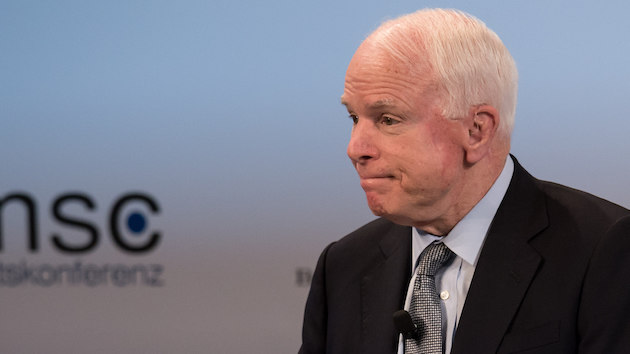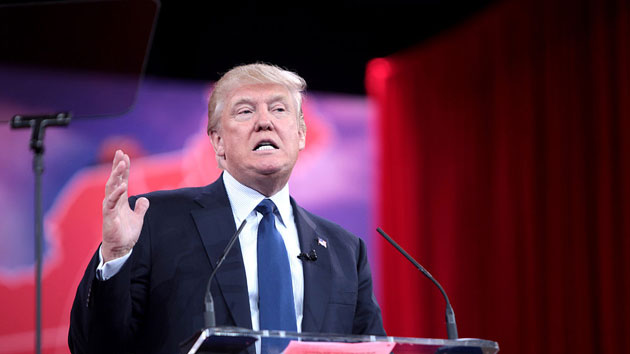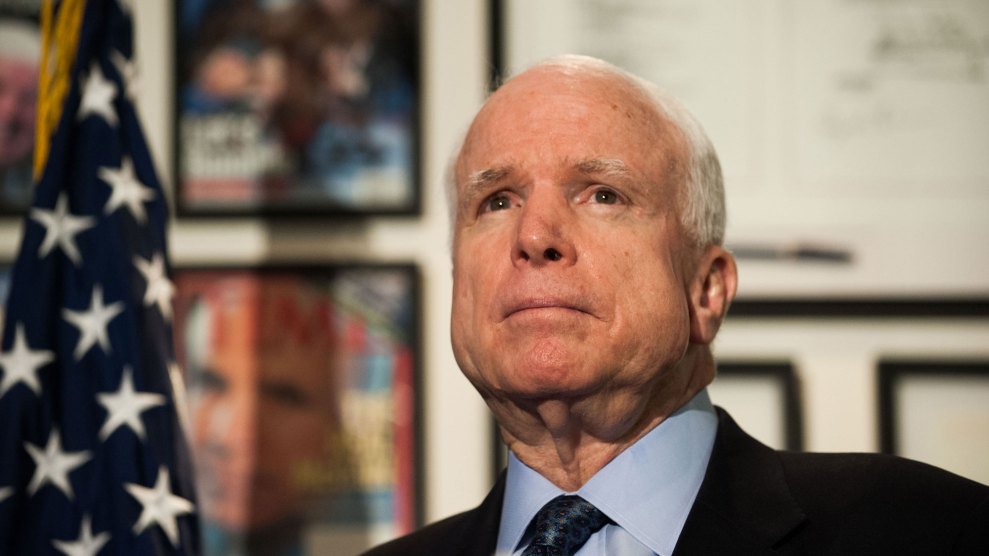
Will Seberger/ZUMA Wire
One Saturday afternoon in June, a few thousand Donald Trump supporters wearing T-shirts with slogans such as “Italian Lives Matter” and “I’m the infidel Allah warned about” streamed into the Arizona State Fair Grounds in Phoenix, to hear the newly minted Republican nominee speak at a venue known locally as the “Mad House.” Walking among the rallygoers, Maricopa County Sheriff Joe Arpaio was greeted by a succession of cheers from the crowd, a reception befitting a man whose immigration raids and birther task force had foreshadowed Trump’s rise. On stage, former Gov. Jan Brewer, an immigration hardliner who clashed with the White House on border security, warmed up the crowd with a chant of “Build! That! Wall!”
When it was his turn onstage, Trump egged on his supporters’ delirium with visions of triumph. “We are going to do unbelievably well with the Mexicans,” he said. Earlier that day Trump had met with Arizona’s new governor, Doug Ducey, and schmoozed with donors and dignitaries at the Paradise Valley house where Sen. Barry Goldwater launched his 1964 campaign.
One Arizona Republican was conspicuously absent during Trump’s visit—the state’s 79-year-old senator, John McCain. A spokeswoman explained to reporters that McCain, who is running for his sixth term, would have to miss Trump’s appearance because of a “campaign-related” conflict. But McCain had no events scheduled that weekend. The real conflict was more existential: Trump’s toxic campaign was dragging him down as well. Eight years after serving as the party’s presidential nominee, McCain skipped this year’s Republican convention. He confessed to a room of donors in May that if Trump continued to alienate Arizona’s Hispanic voters, “this may be the race of my life.”
And it is.
The fall presidential campaign is the final act in a defining saga of the Obama era, the story of how the party of John McCain became the party of Donald Trump. More than perhaps any other state in America, Arizona was an early adopter of Trump’s nativist brand of politics. McCain was not a passive actor in this drama. Republicans won election after election by channeling a style of grievance politics embodied by his former running mate, Sarah Palin, and fueled by an immigration fight McCain sometimes inflamed. Now McCain is just trying to hold on.
He will almost certainly survive his August 30 primary to face Rep. Ann Kirkpatrick, a top Democratic recruit with a long record of winning tough races, in November. But he has had to endure a pesky primary battle against Kelli Ward, a little-known state senator who once held a public hearing on the conspiracy theory that the government has been deliberately poisoning citizens via “chemtrails.” His job approval rating is among the lowest in the Senate, and Hillary Clinton is neck and neck with Trump in a state that has voted Democratic once since 1948.
McCain, a camera-happy curmudgeon who years ago earned a reputation as a “maverick” fighting for campaign-finance reform, is an unpopular politician running with an unpopular nominee. Ask him if he thinks Trump can handle the nuclear arsenal, and he stammers uncomfortably. But even though Trump has suggested McCain is not a war hero because he was captured in Vietnam and once called him a “dummy” who should be defeated in his primary, McCain has promised to vote for Trump. McCain’s conundrum is easier stated than solved: To win, he needs the party—but his party has gone to the Mad House.
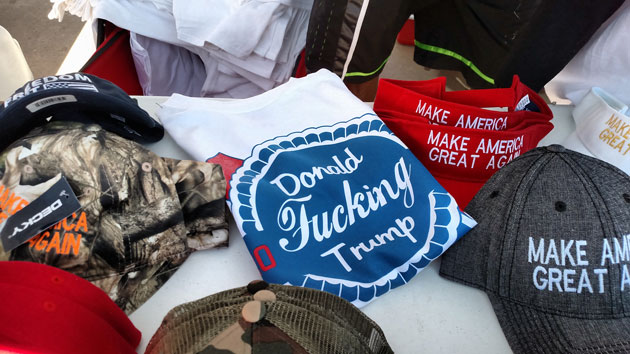
Everyone in Arizona has an opinion on McCain, but until recently few people had even heard of his primary opponent, Kelli Ward. I caught her one weekday afternoon at a truck stop an hour north of Phoenix in Black Canyon City, where Ward was scheduled to meet with a few dozen supporters over lunch. Taking a seat in the shadow of a mounted longhorn head, I was approached almost immediately by a Ward staffer who briefed me on the ground rules. Ground rules? Evidently, the campaign had a policy of prohibiting reporters from recording Ward while she was speaking, because there had been some “issues” with McCain backers recording her events. This was unusual. Candidates expect to be recorded at events, and tracking your opponents’ statements is S.O.P. When I protested, the staffer suggested I take it up with Ward.
Ward, a 47-year-old physician, sounded confused when I brought it up. “I’ll have to check with them because they’re the staff.”
Doesn’t the staff answer to the boss?
Well, she said, she would “confer with them.”
But now she was on edge. She turned to the college student sitting next to me and asked, “Are you with him too?” He was not. “Who are you with? With John McCain?” she pressed. He assured her that he was just a political junkie. “You’re not a McCain guy?” No, he said. He was just a guy from Mesa. His name was Ben.
In the end Ben and I were allowed to stay (and I was allowed to keep my recorder), so I can report that Ward is energetic but raw, with a habit of conveying what should be a sober, serious point in rhyming couplets. As in, “I am ready to mix the mortar—to fix the border,” and “I want AZ in DC instead of DC in AZ.” She promises voters that she will be their “BFF,” which stands for a “bold, fresh, fearless” voice in Washington.
Ward is relatively new to politics. Raised in West Virginia, she moved to Arizona after medical school to work as an ER doctor in Lake Havasu, a resort town in the most conservative county in the state, and won election to the state Senate in 2012. She traces her conservative evolution to 9/11, when she first began listening to Rush Limbaugh. Ward’s platform encapsulates the Republican Party’s post-2008 metamorphosis. She would stop voting to raise the debt ceiling. She would repeal Obamacare. She would build Trump’s wall.
In June, after McCain faulted Hillary Clinton for the rise of ISIS, Ward countered that McCain was in fact “directly responsible” for the rise of the Islamic State. Like Trump, she has a tendency to amplify fringe ideas. At a 2013 legislative hearing, she suggested that the Affordable Care Act was part of a plot to relocate rural Americans to urban areas by lowering the quality of rural health clinics. In 2014, she traveled to Cliven Bundy’s Nevada ranch in a show of solidarity with his standoff against the Bureau of Land Management, and later she called the protest—at which protesters trained rifles at federal agents—a “family-friendly” gathering.
And then there are the chemtrails, the streaks left in the sky by aircraft, which conspiracy theorists believe contain chemical or biological agents. Mohave County is home to a high density of such believers, and Ward once did an hourlong radio interview with one of them in which they discussed the possible presence of Russian or Chinese helicopters in Phoenix. (“I would rather for people to be prepared and ready,” Ward said, cryptically.) In 2014, she held a hearing to listen to constituent concerns about chemtrails, and left open the possibility that she would introduce legislation on the matter.
So it is easy to see why Team Ward was so jumpy about people with smartphones. McCain’s campaign has run ads featuring clips from Ward’s hearing, dubbing her “Chemtrail Kelli.” Another spot featured audio of Ward saying she opposed the National Defense Authorization Act (NDAA), the annual funding bill for the military, as a gravelly voiced narrator accused her of putting Americans at risk. Arizona Grassroots Action, a pro-McCain super-PAC that shares the same Virginia address as McCain’s campaign, welcomed Ward to the race last July with an ad written entirely in skywriting script.
“You need to come back on those ads on talk radio; you’ve got to say what you’re telling us,” one man told her when she finished speaking at the truck stop.
“Well, remember he’s got more money than God, so he’s gonna be out there attacking me,” Ward said.
Another man walked up. “I hear those commercials all day—at least four or five,” he said.
“Oh they’re everywhere,” Ward said. “Trust me. They’re everywhere.”
As she smiled for photos, Ward chatted about Trump. She told me she supported the Muslim ban. And she said she would halt all immigration, on the reasoning that even children of immigrants might eventually become radicalized. Trump’s attack on McCain’s stint as a prisoner of war was fair game, too. In her view, it exposed a vulnerability she hoped to exploit.
“I think that the pundits and the political elites seriously overestimated the belovedness of Sen. McCain, and I think they thought that was going to be the death knell of Donald Trump’s campaign,” Ward said, referring to Trump’s comments on POWs. “However it seems to be the bugle call. And it’s not the attack on Sen. McCain in particular—it’s that he’s attacking the insiders, he’s attacking the establishment, he’s attacking the media. He’s given voice to what so many hardworking American citizens feel.”
Ward was banking on the Trump wave carrying her to victory. She was not only preaching a similar message; she was exploiting the same nontraditional mediums—such as the conspiracy-riddled radio show of InfoWars founder Alex Jones, who has accused McCain of being a North Vietnamese agent who faked being tortured. His views, including that the Israelis were responsible for 9/11, would make Jones persona non grata to most candidates, but Ward happily did his show this spring.
“Alex Jones has a huge listenership that votes, and they should know that there’s an alternative out there to Sen. John McCain,” she told me. As a matter of fact, she added, brightening, she had recently met three InfoWars listeners after an event, young men of “Hispanic descent” who told her they wanted to get involved with her campaign. “Sen. McCain has a lot of power, he has a lot of ability to silence certain aspects of the media, he has the power to buy more time than I will ever have,” she said. “So I have to get the word out through every other mechanism that I can.”
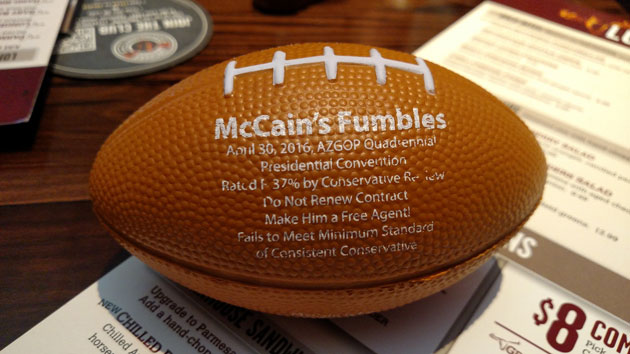
If you wanted to pinpoint the moment American politics began its inexorable slide into the pit of paranoia, you could start on the first Tuesday of November in 2008, at the swanky Biltmore resort and spa in Phoenix, where McCain’s presidential dreams came to an end and Sarah Palin’s began. McCain, though long regarded warily on the right, had been the most prominent senator in America for almost a decade, critiquing the conduct of the Iraq War, pushing immigration reform, and inveighing on everything from steroids to torture. He carried the party’s torch with a degree of solemnity. When a supporter voiced concerns about his “Arab” opponent—Obama—McCain gently took her microphone. “Sen. Obama is a decent person, and a person you don’t have to be scared of,” he said.
It had been Palin’s job to paint a darker portrait of the race. “This is not a man who sees America as you and I do,” she said of Obama. She claimed he had spent time “palling around with terrorists.” Even at her most incendiary, though, she was following a script written by McCain’s aides, and by Election Day they seemed to recognize they had created a monster. They shot down her request to give a separate concession speech, and when Palin entered the ballroom at the Biltmore with her family, McCain staffers were so afraid she’d steal the show that they shut off the lights.
Two years later, the tea party, with Sarah Palin at its helm, swept Republicans into power in the House and in state capitols nationwide. Her message was rooted in something she had begun to articulate in 2008: Crony capitalists and Washington elites—who don’t see America like you and I do—were undoing what was great about Real America. You can see it now as a blueprint for Trumpism. Among the activists who saw potential in Palin’s identity politics was conservative filmmaker Stephen Bannon, who urged her to run for president. When she didn’t, Bannon took his ideas to Breitbart News and eventually found a champion in Trump. He’s now the Trump campaign’s CEO.
Arizona was uniquely positioned for a nativist surge. By 2009, the state’s economy, built on the back of the housing boom, was in the middle of a collapse so severe that the state Legislature eventually had to sell the Capitol itself to raise money. Democrats and Republicans alike had struggled for the better part of a decade to stem the flow of undocumented migrants into their state, and when Obama hired Democratic Gov. Janet Napolitano as secretary of homeland security, her job fell to the next in line, Republican Secretary of State Jan Brewer. What followed was a mess of headline-grabbing hearings, bills, and probes, the most incendiary of which focused on illegal immigration.
Locked in a tough Republican primary in 2010, Brewer filmed a memorable campaign ad in the desert 30 miles outside Phoenix, next to a new Bureau of Land Management sign warning visitors the public lands were unsafe because of drug trafficking. Arizonans were losing their country, and Brewer was fighting back. With the backing of McCain, Brewer signed SB 1070, which allowed local law enforcement to arrest anyone without proper ID—effectively sanctioning racial profiling by the police. The most visible of those law enforcement officials was Joe Arpaio, whose Maricopa County Sheriff’s Office was already being investigated by the Justice Department for civil rights abuses.
A gruff Northeastern transplant who never met a camera he didn’t like, Arpaio dialed his bombast up to 11, turning the sober work of policing one of the most highly populated counties in the United States into an actual reality show. (In one episode, he and Steven Seagal, whom Arpaio had enlisted as a sheriff’s deputy, used a tank to bulldoze a home they suspected of hosting a cockfighting ring.) Around the same time Trump was promising to send a team of investigators to Hawaii to investigate the president’s origins, Arpaio commissioned a “cold-case posse” to uncover Obama’s true birthplace, at the request of a tea party group. Arizona’s emergence as the vanguard of Palin’s kind of politics was not lost on Palin. She frequently campaigned for Republican candidates in the state and purchased a house in ritzy Scottsdale, fanning speculation that she might seek a Senate seat there in 2012. (She is currently in the process of selling that home.)
The rightward lurch left McCain in a tough position. His push for a sweeping immigration reform bill in 2006 put him in the mainstream of the party but was considered a betrayal by conservative activists, particularly in Maricopa County, which is home to more than half of Arizona’s population. At least three times since 2008, the county Republican committee has voted to censure McCain for his past support of immigration reform, and other counties have followed its lead. But immigration was a gateway drug for a litany of other grievances against McCain.
A few days before Trump’s rally at the Mad House, I had lunch with Rob Haney, a former Maricopa County GOP chairman who had sponsored the first of those censure resolutions. As I sat down, he removed a foam football from a bag and handed it to me. On it were a list of “McCain’s fumbles,” a chronicle of the senator’s worst offenses. His sins included working on the Gang of Eight immigration reform bill, being a “Manchurian candidate” who “abandoned [his] wife & POWs,” and praising Hillary Clinton. Last May, at a protest in Tempe with state Senate President Andy Biggs—who is now a candidate for Congress—Oath Keepers founder Stewart Rhodes said McCain “should be tried for treason before a jury of his peers,” after which “he should be hung by the neck until dead.” Among his crimes: allegedly blocking Texas Rep. Ron Paul’s attempt to force a floor fight at the 2012 Republican National Convention.
Tom Morrissey, a retired U.S. Marshal and former state Republican Party chair, captured the shift in the Republican electorate over the past eight years. Morrissey had once been a member of a band called the Ohio Express, and when we met at his home in June he sang me a few bars of the hit that earned him a gold record, “Yummy, Yummy, Yummy I Got Love in My Tummy.” His second-biggest brush with fame came in 2012, when as a representative to the Electoral College he said he wasn’t sure if the president’s birth certificate was real. (This ultimately prompted his resignation.) Right before our interview, he had been powwowing with Steven Seagal, with whom he is co-writing a novel based on the ATF’s “Fast and Furious” gun-trafficking scandal.
His election as state party chair in early 2011, backed as a dark horse by activists including Haney, heralded the ascendance of the GOP’s tea party wing over the more staid McCainiacs. When Morrissey beat out the establishment’s pick for the job, he said the national party told him he was on his own, so he brought in right-wing celebs such as Seagal, Ted Nugent, and Joe the Plumber to raise money. Morrissey is also a close confidant of Arpaio—the sheriff was the best man at his wedding—and when Arpaio was thinking of endorsing Trump, he talked it over with Morrissey first. “Joe’s the face of Arizona,” he said proudly. “[Trump] is saying what Joe’s been saying for 20 years on immigration.”
Morrissey volunteered for McCain during his earlier races, but he was supporting Ward in the primary and was unsure if he could bring himself to back McCain in November. “I won’t attack the man, I’m not gonna do that, but I think for the good of the country—which should be the prime motivation of all of us!—we’d be much better served by somebody else who’s a Republican,” he said.
McCain was acutely aware of the struggle for his party’s soul. He has been engaged in a never-ending game of whack-a-mole with these activists. Arizona Grassroots Action, the super-PAC run by McCain allies, has gone after anti-McCain leaders including Haney, whose censure resolutions have been a source of embarrassment. Last year, the group orchestrated a purge of the Maricopa GOP by pouring money into races for precinct committeemen, in the hopes of forestalling any more censure resolutions. Pro-McCain forces successfully pushed out the Maricopa GOP chair and then placed the man Morrissey defeated, Robert Graham, in charge of the state Republican Party. But this spring, even with a McCain-backed candidate now running the local party, the Maricopa County GOP voted, once more, to censure McCain. Meanwhile, Graham, one of the speakers who revved up the crowd at Trump’s June rally at the Mad House, has proven to be one of the GOP nominee’s loudest boosters in the state.
“There’s a culture of nuttiness,” said Tyler Montague, a prominent Republican activist from Mesa who helped run the successful recall campaign against the author of SB 1070. Montague has backed McCain but was not sure who he would support for president. “Common Core—they just can’t talk enough about it! It’s a communist plot to take over our children’s minds. It’s Obama—he dreamt it up to control us! They just think wacky stuff that normal people don’t think. It’s endemic.”
It’s gotten to the point where Republicans like him look at the county GOP and don’t recognize their party. “One guy said, ‘I feel like a black man at a Klan rally,'” Montague recalled. “And this is a guy who’s a longtime Arizona active Republican. His father was in the Legislature for years.”
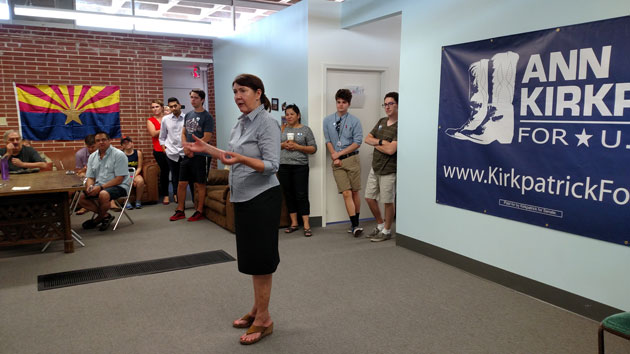
In past reelection battles, McCain has easily dispatched challengers from the right with aggressive advertising barrages and then cruised past token Democratic opposition. In his four previous general election campaigns he has dispatched, with relative ease, a community activist, an environmental lawyer, an eighth-grade social studies teacher, and a Tucson city councilman who had written a series of children’s books about a rainwater-harvesting jackrabbit named Jeremy. The difference now is that McCain has to worry about what happens after the primary. Ann Kirkpatrick may be his first serious Democratic challenger ever.
When we met at her Tempe campaign office in early June, Kirkpatrick had just launched a broadside that seemed to neatly define McCain’s dilemma. It was a reprisal of a now-infamous ad McCain had filmed during his 2010 primary campaign against former Rep. J.D. Hayworth, a talk radio host who was trying to ride the wave of tea party resentment to victory. McCain stole Hayworth’s mojo by positioning himself as a border security hardliner. In the ad, McCain walked the border with Pinal County Sheriff Paul Babeu, rattling off different kinds of violent crimes being committed by what Babeu referred to as “the illegals.” Then McCain delivered the money shot: “Complete the danged fence.” (A Trump backer who is now running for Kirkpatrick’s seat in Congress, Babeu ran for a different seat in Congress four years ago but dropped out after he was outed as gay by an undocumented man he’d had a relationship with.) All Kirkpatrick did was include Spanish subtitles. She ran it on Univision during a Mexican soccer game. Trump’s name was never mentioned; it didn’t need to be.
“The shocking thing to me is that John McCain supports Donald Trump,” Kirkpatrick told me, sounding not entirely shocked. “He used to be the maverick, he used to be the straight-talker. And honestly, because of how I grew up, I’m very sensitive to the racist, hateful things that [Trump] is saying.”
Kirkpatrick was born in McNary, Arizona, a once-booming logging town on the White Mountain Apache Nation, three and a half hours northeast of Phoenix, and she grew up on tribal land in Whiteriver. Her family is white, but she spoke Apache and later picked up Navajo. “English has always been kind of a second language for me,” Kirkpatrick said, “but I feel like I’ve become fluent.” She recalled the freedom of reservation life, but also its challenges. Whiteriver didn’t have access to clean drinking water until Kirkpatrick’s first term, when she struck a deal with the Environmental Protection Agency to build a pipeline into town; when she was growing up, her family had boiled water in a pan on the stove.
She was elected at the crest of a blue wave in 2008 as a conservative Democrat, sporting an A-rating from the National Rifle Association and a pair of patched-up cowboy boots she purchased with waitressing tips as a teenager. But her vote for Obamacare was a death warrant. She earned a spot on Palin’s “hit list” of 20 politicians targeted by her political action committee. The writing was on the wall in the summer of 2010, when Kirkpatrick walked out of an event in her district. Although it had been billed as an opportunity for constituents to meet one-on-one with the congresswoman, the tone grew hostile as angry constituents waiting in line demanded she answer the group’s questions town-hall style. The video of the congresswoman turning and “running” from the voters is canonical among Arizona Republicans. McCain resurrected the footage in an ad last month.
The central argument of her campaign has been that McCain, once a crusader for good government and Vietnam vets, embraced a more cynical kind of politics around the time he made Palin a national figure in 2008. Picking Palin, Kirkpatrick said, constituted a “national security risk.” “There are people in Arizona who lost faith in John McCain’s judgment when he named her as the vice presidential candidate,” she said. “And there are people nationally that are saying he kind of paved the way for someone like Trump.”
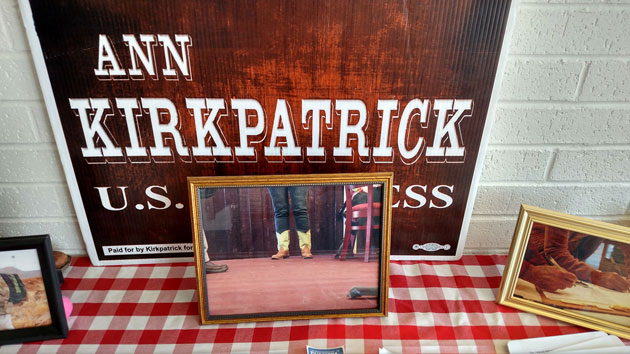
Even some of McCain’s biggest boosters are waiting for the maverick of old to reappear. Chuck Coughlin, a staffer on McCain’s first run for Senate in 1986, concluded McCain was the real deal at their first meeting, when Coughlin chauffeured the first-time candidate to a VFW convention in Cleveland. “He gets up there, and he goes, ‘You know it’s good to be here with all you veterans today, but you know I always pray for Marines, I always pray for the Marine Corps, particularly on Father’s Day, because I know many of you don’t know who your dad is,'” Coughlin said, in his best nasally McCain voice. “I thought he was gonna get fucking killed, man. The place was totally silent—and then everybody started laughing.”
Sitting back on his couch in front of an old poster of McCain, Coughlin, who later worked for a succession of Republican officials including Brewer, spoke of his former boss with a mix of reverence and frustration. He told me he had recently been rereading one of his favorite McCain speeches. It was a canonical moment in McCain lore, when in February 2000, the first-time presidential candidate traveled to Virginia the day before the state’s primary to denounce two of the commonwealth’s leading conservative figures, Pat Robertson and Jerry Falwell, as “agents of intolerance.” That was the guy Coughlin and people like him had gone to the mattresses for. “I think it’d be great to hear that guy right now,” he said.
But for that to happen, he believes McCain needs to dump Trump. “There’s a great line from Hamilton, from the play, when Jefferson leaves the cabinet—he goes, ‘You can’t put a fire out from inside the house,'” Coughlin says. “And I think that’s true. ‘Cause there’s a dumpster fire going on inside our house and somebody’s going to have to speak to that. I think John McCain’s the likely guy to speak to that.”
It’s still McCain’s race to lose. Although most general election polls have shown a narrow lead for the senator over Kirkpatrick, a new CNN survey gave McCain a 13-point advantage, suggesting that for now at least, Trump’s struggles might not spell disaster for everyone else. In a statement, McCain spokeswoman Lorna Romero touted the campaign’s organizational advantages—it has contacted more than 3 million voters ahead of the primary—and slammed Kirkpatrick as a standard-issue liberal. “[H]er only accomplishment is being a rubber stamp for President Barack Obama including her support of Obamacare, the failed federal stimulus, reckless spending, ?a? feckless foreign policy that has made us less safe, and the dangerous Iran nuclear deal,” Romero said. “We are confident that when voters compare John McCain’s record of fighting for Arizonans to Democrat Congresswoman Kirkpatrick’s forgettable tenure, they will proudly vote McCain.”
But for the time being, the role of the Arizona maverick is being filled not by McCain, but by his junior colleague, Sen. Jeff Flake, a Mormon from Mesa who chastised Trump at a Capitol Hill meeting in July and has withheld his support for the nominee. It was Flake, not McCain, who called for an end to the chants of “lock her up!” at Republican rallies, and it was Flake who appeared most willing to speak out against Trump’s criticism of McCain and other POWs. Finally, in late July, after Trump criticized the parents of a Muslim soldier who died in Iraq, McCain finally seemed ready to take a stand. He ripped into his party’s nominee, writing in a statement that simply winning a party’s nomination did not grant Trump “unfettered license to defame those who are the best among us.” It was his toughest critique yet. But at a press conference later that week, McCain got testy when he was asked if he would change his endorsement. “I’ll tell you what: Anytime from now on, when that question is asked, if I change my mind, I’ll let you know,” McCain said. Gleeful, the Kirkpatrick campaign blasted out a press release touting that this was the 49th time McCain had endorsed Trump.
Trump responded with trademark vindictiveness. Although he would eventually signal his support, under pressure from party leaders, Trump told the Washington Post the next day that he would not support McCain in the Arizona primary. “I’ve never been there with John McCain because I’ve always felt that he should have done a much better job for the vets,” he said.
The message was clear: It was his party now.
This story has been revised.


